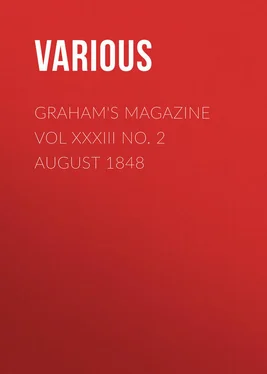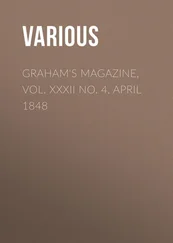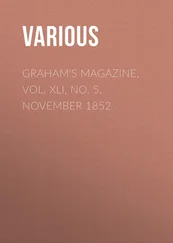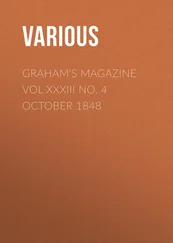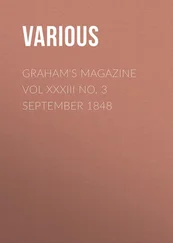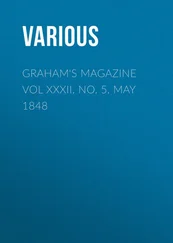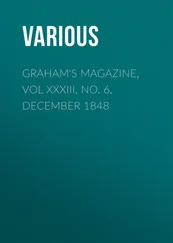Various - Graham's Magazine Vol XXXIII No. 2 August 1848
Здесь есть возможность читать онлайн «Various - Graham's Magazine Vol XXXIII No. 2 August 1848» — ознакомительный отрывок электронной книги совершенно бесплатно, а после прочтения отрывка купить полную версию. В некоторых случаях можно слушать аудио, скачать через торрент в формате fb2 и присутствует краткое содержание. Издательство: Иностранный паблик, Жанр: periodic, literature_19, foreign_edu, на английском языке. Описание произведения, (предисловие) а так же отзывы посетителей доступны на портале библиотеки ЛибКат.
- Название:Graham's Magazine Vol XXXIII No. 2 August 1848
- Автор:
- Издательство:Иностранный паблик
- Жанр:
- Год:неизвестен
- ISBN:нет данных
- Рейтинг книги:5 / 5. Голосов: 1
-
Избранное:Добавить в избранное
- Отзывы:
-
Ваша оценка:
- 100
- 1
- 2
- 3
- 4
- 5
Graham's Magazine Vol XXXIII No. 2 August 1848: краткое содержание, описание и аннотация
Предлагаем к чтению аннотацию, описание, краткое содержание или предисловие (зависит от того, что написал сам автор книги «Graham's Magazine Vol XXXIII No. 2 August 1848»). Если вы не нашли необходимую информацию о книге — напишите в комментариях, мы постараемся отыскать её.
Graham's Magazine Vol XXXIII No. 2 August 1848 — читать онлайн ознакомительный отрывок
Ниже представлен текст книги, разбитый по страницам. Система сохранения места последней прочитанной страницы, позволяет с удобством читать онлайн бесплатно книгу «Graham's Magazine Vol XXXIII No. 2 August 1848», без необходимости каждый раз заново искать на чём Вы остановились. Поставьте закладку, и сможете в любой момент перейти на страницу, на которой закончили чтение.
Интервал:
Закладка:
Zophiël, who by the power of Lucifer has been detained struggling in the grove, is suffered once more to enter the presence of the object of his affection. He sees her supported in the arms of Helon, whom he makes one futile effort to destroy, and then is banished forever. The emissaries of his immortal enemy pursue the baffled seraph to his place of exile, and by their derision endeavor to augment his misery,
And when they fled he hid him in a cave
Strewn with the bones of some sad wretch who there,
Apart from men, had sought a desert grave,
And yielded to the demon of despair.
There beauteous Zophiël, shrinking from the day,
Envying the wretch that so his life had ended,
Wailed his eternity;
But, at last, is visited by Raphael, who gives him hopes of restoration to his original rank in heaven.
The concluding canto is entitled "The Bridal of Helon," and in the following lines it contains much of the author's philosophy of life:
The bard has sung, God never formed a soul
Without its own peculiar mate, to meet
Its wandering half, when ripe to crown the whole
Bright plan of bliss, most heavenly, most complete!
But thousand evil things there are that hate
To look on happiness; these hurt, impede,
And, leagued with time, space, circumstance, and fate,
Keep kindred heart from heart, to pine and pant and bleed.
And as the dove to far Palmyra flying,
From where her native founts of Antioch beam,
Weary, exhausted, longing, panting, sighing,
Lights sadly at the desert's bitter stream;
So many a soul, o'er life's drear desert faring,
Love's pure, congenial spring unfound, unquaffed,
Suffers, recoils, then, thirsty and despairing
Of what it would, descends and sips the nearest draught.
On consulting "Zophiël," it will readily be seen that the passages here extracted have not been chosen for their superior poetical merit. It has simply been attempted by quotations and a running commentary to convey a just impression of the scope and character of the work. There is not perhaps in the English language a poem containing a greater variety of thought, description and incident, and though the author did not possess in an eminent degree the constructive faculty, there are few narratives that are conducted with more regard to unities, or with more simplicity and perspicuity.
Though characterized by force and even freedom of expression, it does not contain an impure or irreligious sentiment. Every page is full of passion, but passion subdued and chastened by refinement and delicacy. Several of the characters are original and splendid creations. Zophiël seems to us the finest fallen angel that has come from the hand of a poet. Milton's outcasts from heaven are utterly depraved and abraded of their glory; but Zophiël has traces of his original virtue and beauty, and a lingering hope of restoration to the presence of the Divinity. Deceived by the specious fallacies of an immortal like himself, and his superior in rank, he encounters the blackest perfidy in him for whom so much had been forfeited, and the blight of every prospect that had lured his fancy or ambition. Egla, though one of the most important characters in the poem, is much less interesting. She is represented as heroically consistent, except when given over for a moment to the malice of infernal emissaries. In her immediate reception of Helon as a husband, she is constant to a long cherished idea, and fulfills the design of her guardian spirit, or it would excite some wonder that Zophiël was worsted in such competition. It will be perceived upon a careful examination that the work is in admirable keeping, and that the entire conduct of its several persons bears a just relation to their characters and position.
Mrs. Brooks returned to the United States, and her son being now a student in the military academy, she took up her residence in the vicinity of West Point, where, with occasional intermissions in which she visited her plantation in Cuba or traveled in the United States, she remained until 1839. Her marked individuality, the variety, beauty and occasional splendor of her conversation, made her house a favorite resort of the officers of the academy, and of the most accomplished persons who frequented that romantic neighborhood, by many of whom she will long be remembered with mingled affection and admiration.
In 1834 she caused to be published in Boston an edition of "Zophiël," for the benefit of the Polish exiles who were thronging to this country after their then recent struggle for freedom. There were at that time too few readers among us of sufficiently cultivated and independent taste to appreciate a work of art which time or accident had not commended to the popular applause, and "Zophiël" scarcely anywhere excited any interest or attracted any attention. At the end of a month but about twenty copies had been sold, and, in a moment of disappointment, Mrs. Brooks caused the remainder of the impression to be withdrawn from the market. The poem has therefore been little read in this country, and even the title of it would have remained unknown to the common reader of elegant literature but for occasional allusions to it by Southey and other foreign critics. 2 2 Maria del Occidente – otherwise, we believe, Mrs. Brooks – is styled in "The Doctor," &c. "the most impassioned and most imaginative of all poetesses." And without taking into account quædam ardentiora scattered here and there throughout her singular poem, there is undoubtedly ground for the first clause, and, with the more accurate substitution of "fanciful" for "imaginative" for the whole of the eulogy. It is altogether an extraordinary performance. — London Quarterly Review.
In the summer of 1843, while Mrs. Brooks was residing at Fort Columbus, in the bay of New York, – a military post at which her son, Captain Horace Brooks, was stationed several years – she had printed for private circulation the remarkable little work to which allusion has already been made, entitled "Idomen, or the Vale of the Yumuri." It is in the style of a romance, but contains little that is fictitious except the names of the characters. The account which Idomen gives of her own history is literally true, except in relation to an excursion to Niagara, which occurred in a different period of the author's life. It is impossible to read these interesting "confessions" without feeling a profound interest in the character which they illustrate; a character of singular strength, dignity and delicacy, subjected to the severest tests, and exposed to the most curious and easy analysis. "To see the inmost soul of one who bore all the impulse and torture of self-murder without perishing, is what can seldom be done: very few have memories strong enough to retain a distinct impression of past suffering, and few, though possessed of such memories, have the power of so describing their sensations as to make them apparent to another." "Idomen" will possess an interest and value as a psychological study, independent of that which belongs to it as a record of the experience of so eminent a poet.
Mrs. Brooks was anxious to have published an edition of all her writings, including "Idomen," before leaving New York, and she authorized me to offer gratuitously her copyrights to an eminent publishing house for that purpose. In the existing condition of the copyright laws, which should have been entitled acts for the discouragement of a native literature, she was not surprised that the offer was declined, though indignant that the reason assigned should have been that they were "of too elevated a character to sell." Writing to me soon afterward she observed, "I do not think any thing from my humble imagination can be 'too elevated,' or elevated enough, for the public as it really is in these North American States… In the words of poor Spurzheim, (uttered to me a short time before his death, in Boston,) I solace myself by saying, 'Stupidity! stupidity! the knowledge of that alone has saved me from misanthropy.'"
Читать дальшеИнтервал:
Закладка:
Похожие книги на «Graham's Magazine Vol XXXIII No. 2 August 1848»
Представляем Вашему вниманию похожие книги на «Graham's Magazine Vol XXXIII No. 2 August 1848» списком для выбора. Мы отобрали схожую по названию и смыслу литературу в надежде предоставить читателям больше вариантов отыскать новые, интересные, ещё непрочитанные произведения.
Обсуждение, отзывы о книге «Graham's Magazine Vol XXXIII No. 2 August 1848» и просто собственные мнения читателей. Оставьте ваши комментарии, напишите, что Вы думаете о произведении, его смысле или главных героях. Укажите что конкретно понравилось, а что нет, и почему Вы так считаете.
